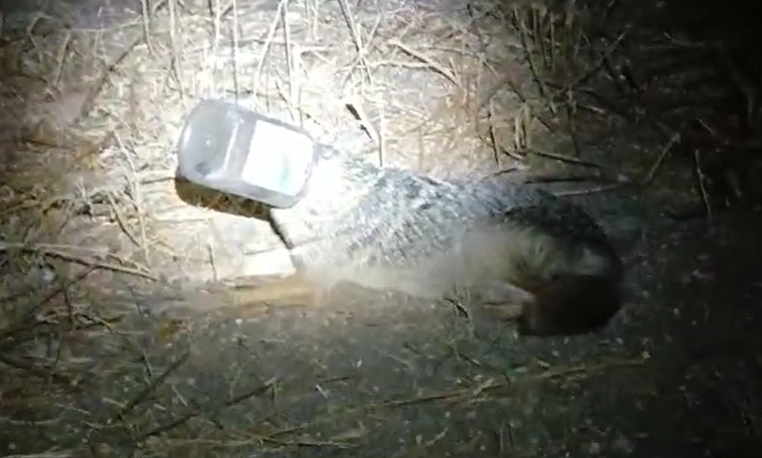A jackal narrowly escaped death after its head became trapped in a plastic cookie box. The hero of the hour was Micha Hanuna, founder of the Bnei Adama organization, dedicated to tracking and ancient survival skills.
Video of the rescue
(Video: Micha Hanuna)
"I was returning from a meeting in the Yishai Forest near Beit Shemesh, focused on tracking animals," Hanuna recounted. "As I was leaving the forest, I spotted an odd-looking animal with a square head. After a few seconds, I realized it was a jackal with its head stuck in a cookie box. I stopped to observe it for a few moments, tracking it with my flashlight. It struck me that it couldn't eat or drink and might even have trouble breathing, so I felt compelled to help."
At that moment, the jackal, perhaps sensing the presence of a rescuer, stopped walking. "Suddenly, it decided to sit down, as if it understood my intentions," Hanuna said. "I approached it quietly, unsure how much it could see through the box. Each time it turned its head toward me, I flashed my light to blind it so it wouldn't know where I was. I'm not sure if it let me get close or if it couldn't hear me because of the box."
Hanuna managed to free the jackal's head from the plastic trap. "I approached slowly, and when I grabbed the box, it resisted for a few seconds and jumped in panic until it finally freed its head. It ran away immediately," he recounted. "I've tried to save several animals before, but this encounter was more thrilling because it could escape. I felt like I saved it from prolonged and unnecessary suffering. Afterward, I reported the incident to a ranger from the Nature and Parks Authority."
The Nature and Parks Authority emphasized the importance of protecting the environment and not discarding items that could endanger wildlife.
"There’s no doubt we live in the age of plastic. The ease of producing plastic and its low cost lead modern humans to generate enormous amounts of plastic, making it highly accessible and useful," the authority said in a statement. "Our homes are filled with numerous plastic products, including disposable containers and utensils, and many food items are sold in plastic packaging. Here's what we don't often realize: A significant portion of the plastic produced is not recycled, and after use it becomes waste that enters various ecosystems."
If you encounter an injured or distressed animal, report it to the Nature and Parks Authority hotline at *3639.




